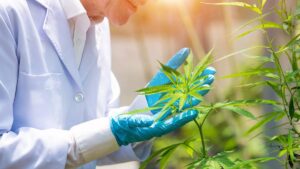Health Check: No sign of frayed nerves as Orthocell girds for US approval

Orthocell is painting a pretty picture on the ASX right now. Pic via Getty Images
- “Outstanding” pivotal trial results paves the way for Orthocell to seek US approval for its Remplir nerve wrap
- Percheron promises Duchenne trial results by Christmas
- Argent Biopharma says it’s not goodbye – or au revoir
Orthocell (ASX:OCC) shares this morning zoomed as high as 26% after the company said it expected to apply for US approval of its Remplir nerve-repair product by the end of the year.
This follows “outstanding” results from its pivotal animal clinical study, which validates Remplir’s use as a “safe and effective” device to repair peripheral nerves surgically.
The study supports previously published findings, showing 85% of Remplir nerve reconstructions resulted in “functional recovery of muscles controlled by the repaired nerve”.
The pivotal study used an established rat sciatic nerve injury model, by which repair of surgically transected (severed) nerves was evaluated in 72 rodents across three treatment groups.
These were suture only (the control group), repair with Remplir and repair with a comparative (predicate) product.
The ‘predicate’ part is crucial, because the company only needs to prove ‘substantial equivalence” to these existing devices (and an animal study can suffice).
Orthocell expects the FDA to grant approval in the March quarter of next year, thus opening up an estimated US$1.6 billion ($2.5 billion) a year market.
Remplir is already approved in Australia, New Zealand and Singapore, so the regulator wont exactly be flying blind in its deliberations.
Orthocell’s news comes at an interesting time for the sector, given last Tuesday’s ASX debut of nerve-repair peer ReNerve (ASX:RNV).
Shares in the less commercially advanced Renerve have traded under par to the 20-cent issue price, but ticked up 12% to 19 cents this morning.
In a prezzo issued today, Renerve estimates the global nerve-repair market will grow at a 17% compound annual rate to US$6.19 billion by 2031.
Renerve has a US-approved nerve cuff, Nervalign, with three other products in development.
Orthocell shares were trading at 95 cents, having gained around 150% over the last year.
Percheron says: whack this one in the festive diary
With all 48 patients treated in its phase IIb Duchenne muscular dystrophy (DMD) trial, Percheron Therapeutics (ASX:PER) says it should announce top-line results within three weeks.
A regressive, fatal and poorly-treated genetic disease, DMD affects about one in 10,000 males who suffer progressive loss of muscle function.
The company says all patients have completed 25 weeks of treatment, the point at which they can be assessed.
The study assesses the efficacy of the company’s lead molecule avicursen (ATL1102), which “exerts an immune-modulatory effect which may be therapeutic in a range of inflammatory diseases”.
The placebo-controlled trial is being carried out across 13 sites including here, the UK, Turkey, Bulgaria and Serbia.
Barring “unforeseen operational delays”, the company expects to announce top-line data in the week beginning December 16.
The trial enrolled non-ambulant (wheelchair-bound) boys, who account for about half of the total DMD population.
Twelve-month data is expected to be available in mid 2025, with final 16-month data later that year.
“We eagerly await the six-month data,” says Percheron chief Dr James Garner.
The FDA has awarded avicursen orphan drug and rare pediatric disease designation, which should hurry things along if the results are positive.
Percheron shares gained 1.3% to 7.5 cents.
Bugger it – we’re staying – says Argent
Drug developer Argent Biopharma (ASX:RGT) has changed its mind on redomiciling to the London Stock Exchange (LSE) and will retain its ASX listing.
Following a detailed review of the listing requirements and costs, Argent has asked the LSE to cancel its listing, effective from New Year’s Eve.
Argent will maintain its listing on the US Over-the-Counter Bulletin Board. Given its operations are based in the US and Europe, the company may seek other opportunities including a dual listing on another US-based exchange.
Formerly MGC Pharmaceuticals, Argent’s claim to fame is that it was the first medical pot play to list on the LSE (in 2021).
These days, the company has cannabis and non-cannabis programs for central nervous system and immunological disorders, including epilepsy and dementia.
Curiously, 99.7% of holders backed the delisting at Argent’s special meeting on October 1. The shares rose 8% after Friday’s backflip, but today opened 7% lower at 25 cents. So perhaps they are easy either way.
$US1.5 billion deal bodes well for Arovella
In the resources sector, ‘nearism’ is talking up the prospects of a tenement based on the riches unearthed on someone else’s ground next door.
The equivalent in biotech is the eyebrow-raising valuations that US acquirers ascribe to early to mid-stage assets.
In this vein, Roche last week acquired Poseida Therapeutics, a phase I cancer cell therapy play, for up to US$1.5 billion.
According to Next Investors, Poseida looks like local cell therapy house Arovella Therapeutics (ASX:ALA).
Arovella is the only ASX-listed entity in the rarefied invariant natural killer T-cell (INKT) sector – and only one of a handful globally.
Poseida works with the same-but different Car-T therapies (‘Car’ stands for chimeric antigen receptor and T refers to T-cells).
Both companies are targeting blood cancer, as well as ‘allogeneic (off the shelf) therapies (as opposed to using the patient’s own material).
Both also have solid tumour programs and are developing platform technologies, which means they can be used across multiple diseases if they work.
Next Investors says Big Pharma appears willing to do deals at a riskier, earlier stage.
“Sometimes, they happen before a company enters the clinic and sometimes before the readout of phase I trial results.”
Arovella’s lead program, ALA-101, shows early preclinical promise as a treatment for certain blood cancers.
A feature of INKT cells is they can be expanded by a factor of 5000 without losing their potency, which makes them cheaper and easier to manufacture.
Arovella shares were 2.6% lower at 18.5 cents.
At Stockhead, we tell it as it is. While Orthocell and Renerve are Stockhead advertisers, they did not sponsor this article
Related Topics

UNLOCK INSIGHTS
Discover the untold stories of emerging ASX stocks.
Daily news and expert analysis, it's free to subscribe.
By proceeding, you confirm you understand that we handle personal information in accordance with our Privacy Policy.








